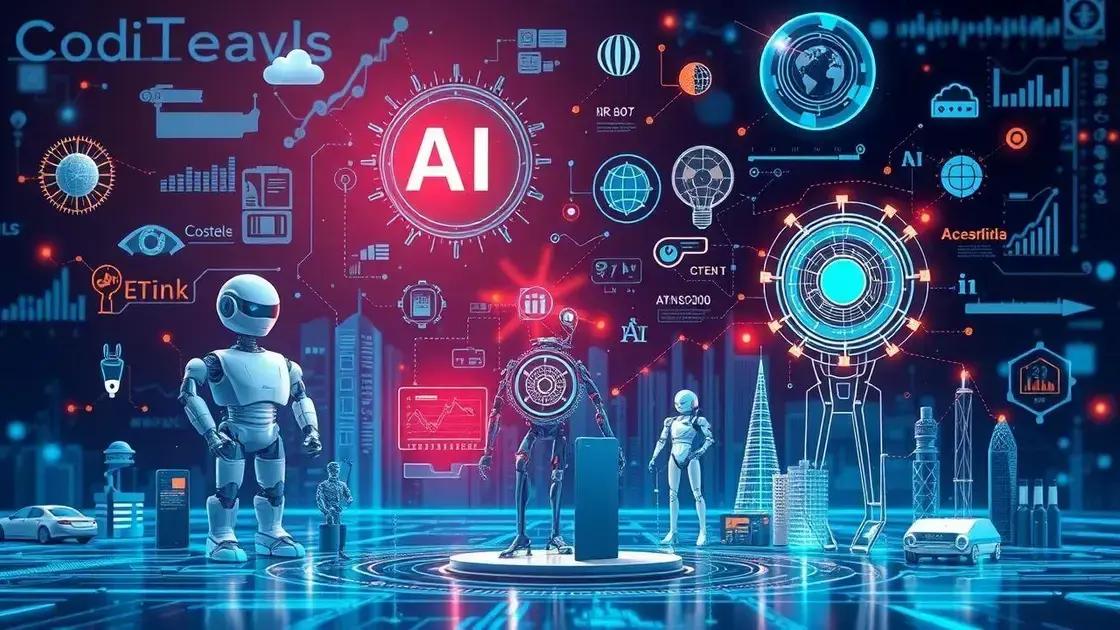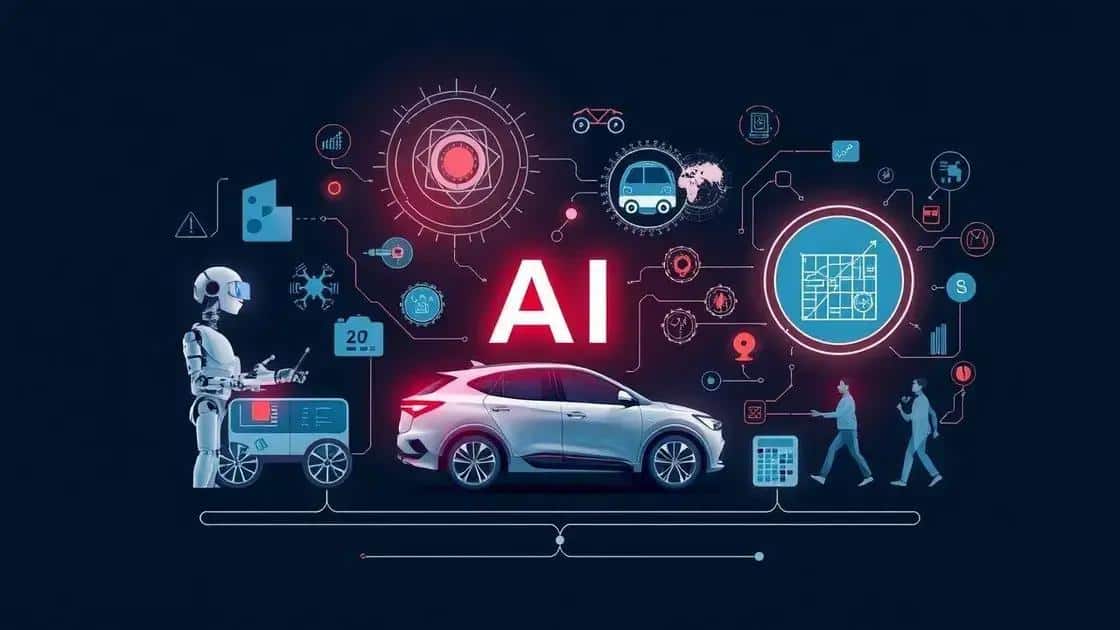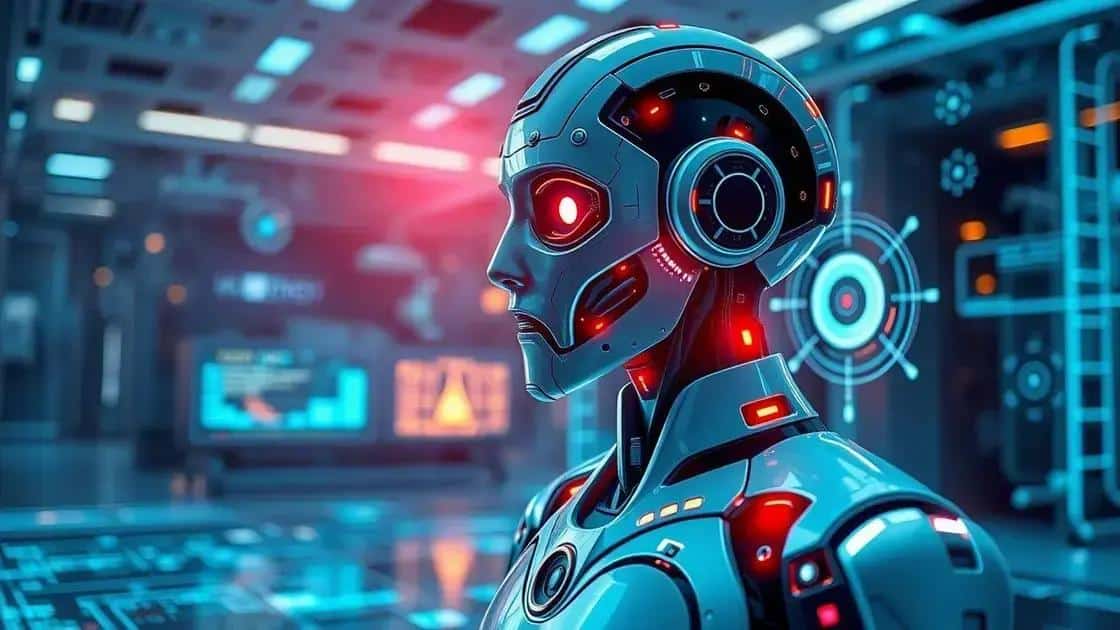AI innovation trends that are changing industries

AI innovation trends are significantly reshaping industries by enhancing efficiency, personalizing user experiences, and introducing advanced automation, while also raising essential ethical considerations.
AI innovation trends are at the forefront of technological advancement today, influencing everything from how we interact online to the strategies businesses use. Have you ever wondered how these trends are shaping our future?
Emerging AI technologies
Emerging AI technologies are transforming the world we live in, making our daily activities easier and more efficient. From healthcare to entertainment, the effects of these innovations are far-reaching and profound.
Key Emerging Technologies
Several cutting-edge technologies are leading the charge in the field of AI. These innovations promise to change how we approach problems and enhance our lives.
- Machine Learning: This technology enables systems to learn from data and improve over time without being explicitly programmed.
- Natural Language Processing: This allows machines to understand and interpret human language, paving the way for better communication between people and devices.
- Computer Vision: This is used to enable machines to interpret and make decisions based on visual data, which is especially valuable in fields like security and healthcare.
As we delve deeper into AI, it’s fascinating to see how these technologies are merging with our everyday lives. For instance, machine learning is applied in various industries from finance to agriculture, revolutionizing data analysis and decision-making processes.
Impact on Society
The influence of these technologies extends beyond technical advancements. With the integration of AI into sectors like education and healthcare, we are witnessing enhanced learning experiences and improved patient outcomes.
Furthermore, as AI technologies become ubiquitous, ethical considerations emerge, prompting discussions on accountability and fairness. Understanding these impacts is crucial for fostering responsible innovation.
Impact of AI on various sectors

The impact of AI on various sectors is both significant and wide-ranging. From healthcare to transportation, AI technologies are transforming how we operate and make decisions.
Healthcare Revolution
In healthcare, AI is enhancing patient care and streamlining operations. For example, machine learning algorithms analyze medical data to assist in diagnosis. This leads to more accurate assessments and personalized treatment plans.
- Predictive Analytics: Anticipates patient needs and potential health risks.
- Robotic Surgery: Improves precision and reduces recovery times.
- Telemedicine: Enables remote consultations, making healthcare more accessible.
Transportation is another sector experiencing profound changes due to AI. Self-driving cars and intelligent traffic management systems are reshaping our daily commutes. These advancements not only improve safety but also increase efficiency on the roads.
Impact on Business
Businesses are rapidly adopting AI to enhance productivity. Companies use AI tools for data analysis, customer service, and inventory management. The result is optimized processes and improved customer experiences.
A notable area is manufacturing, where AI-driven robots are revolutionizing production lines. They work alongside humans, increasing efficiency and reducing costs. Moreover, the use of AI in supply chain management helps businesses anticipate demand and minimize waste, leading to more sustainable practices.
As the integration of AI continues to evolve, it is crucial for sectors to adapt and embrace these technologies. Understanding the impact of AI across different industries enables professionals to leverage its benefits effectively.
How businesses are adapting to AI
Businesses today are rapidly learning how to adapt to the growing influence of AI. Embracing these changes allows companies to remain competitive and innovate efficiently.
Implementing AI Technologies
One of the first steps organizations take is integrating AI technologies into their operations. This can include automated systems for customer service or advanced analytics for data processing. By leveraging AI, businesses can streamline workflows and reduce operational costs.
- Chatbots: Many companies utilize chatbots to provide instant customer support and improve user engagement.
- Data Analysis Tools: AI-powered tools help businesses interpret large volumes of data quickly, leading to better decision-making.
- Supply Chain Optimization: Automating logistics processes ensures that products are delivered efficiently, minimizing delays and costs.
Furthermore, companies are investing in training their workforce to effectively work alongside AI. This training helps employees understand how to utilize AI tools to enhance their productivity. As a result, the overall synergy between human workers and AI systems becomes stronger.
Adapting Business Models
Additionally, businesses are reevaluating their models to incorporate AI methods. For example, traditional retail stores are shifting toward e-commerce, utilizing AI for personalized shopping experiences. Such changes are essential for reaching a broader customer base and staying relevant in the digital age.
As companies adapt to these transformations, collaboration with technology providers becomes vital. Establishing partnerships with AI developers allows businesses to access the latest innovations. This collaboration leads to customized solutions tailored to specific industry needs, enhancing overall efficiency and effectiveness.
Future predictions for AI trends

The future predictions for AI trends suggest a landscape filled with innovation and opportunity. As technology evolves, we can expect AI to play an even larger role in our daily lives and industries.
Advancements in AI Capabilities
One primary trend is the continued advancement of AI capabilities. Innovations such as deep learning and neural networks will lead to even smarter machines. These technologies can generate new ideas and solutions automatically, dramatically improving efficiencies across various sectors.
- Enhanced Automation: Increased automation of complex tasks will occur, releasing human resources for more creative endeavors.
- Improved Personalization: AI will be better at predicting customer needs, leading to personalized experiences across websites and services.
- Stronger Data Security: As AI develops, it will also play a vital role in enhancing cybersecurity measures.
Meanwhile, the impact of AI on the workforce is another major area of prediction. While some fear job loss due to automation, new roles will emerge that focus on using and managing AI technologies. This will require us to adapt our skills and education systems.
The Rise of Ethical AI
Additionally, with the growth of AI, the demand for ethical standards will rise. Companies and developers will be urged to create AI solutions that are transparent and fair. This will lead to industry-wide guidelines governing the responsible use of AI.
Consumer trust will become essential, as people need to feel secure in how their data is used. The dialogue around ethical AI will be critical in shaping the future of technology.
As we look ahead, collaboration among tech companies, regulators, and consumers will pave the way for responsible advancements in AI. Understanding these future predictions will help us prepare for the exciting changes ahead in the field of AI.
In conclusion, the landscape of AI is rapidly changing and expanding, influencing a variety of sectors and transforming how we live and work. As businesses adapt to these innovations, we can expect more personalized experiences and efficient operations. The future predictions for AI trends point toward advancements that will augment our capabilities while also presenting challenges, especially in terms of ethics. It is essential to embrace these changes, focusing on responsible and inclusive development of AI technologies.
FAQ – Frequently Asked Questions about AI Innovations
How is AI impacting different industries?
AI is transforming industries like healthcare, transportation, and finance by improving efficiency, personalization, and decision-making.
What are the key benefits of businesses adapting to AI?
Businesses adopting AI can enhance productivity, improve customer service, and streamline operations, leading to increased competitiveness.
What future predictions can we expect regarding AI technologies?
Future predictions include advancements in machine learning, improved personalization, and a stronger focus on ethical AI practices.
How important is ethical consideration in AI development?
Ethical considerations are vital in AI development to ensure transparency, fairness, and consumer trust in AI technologies.





